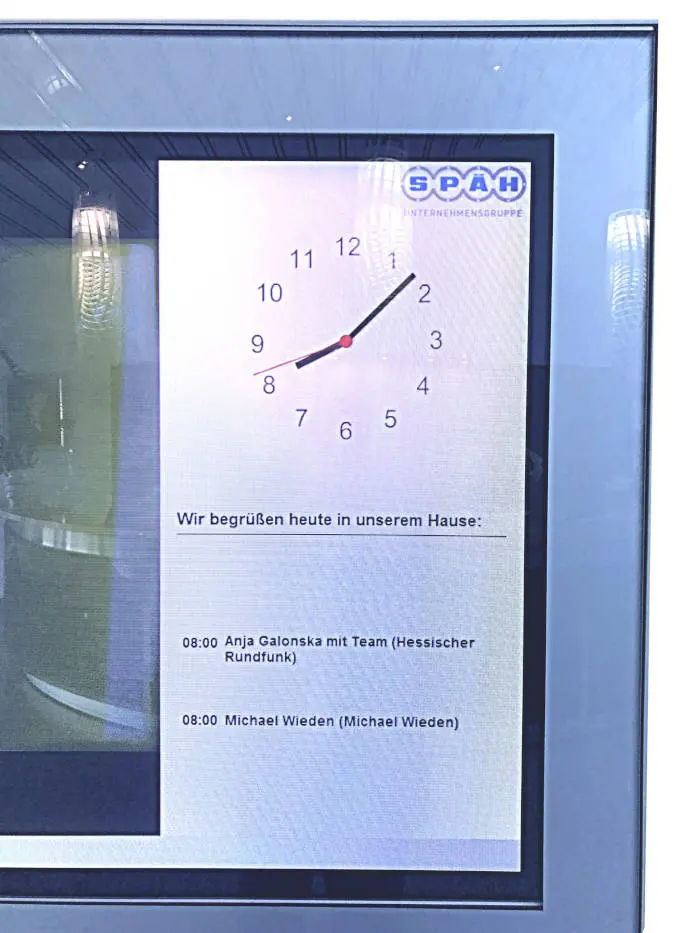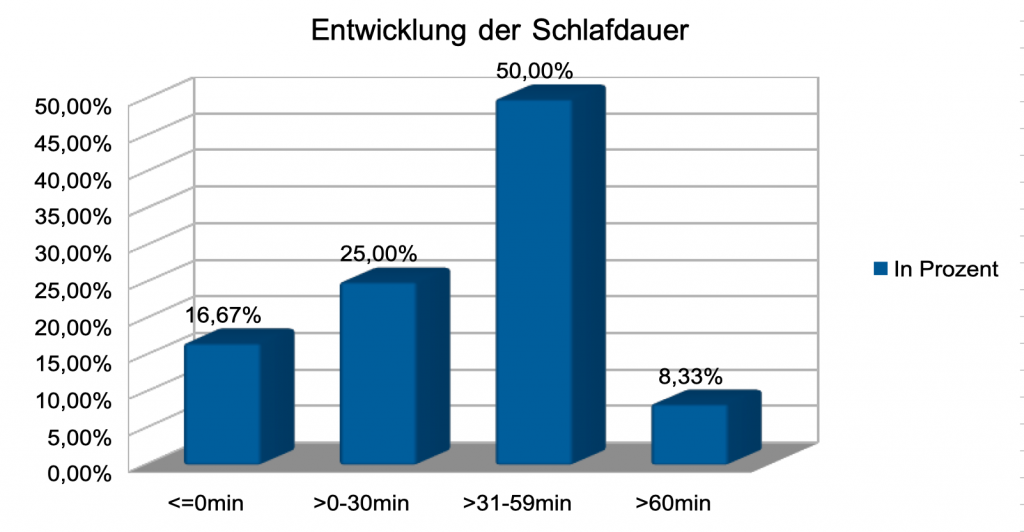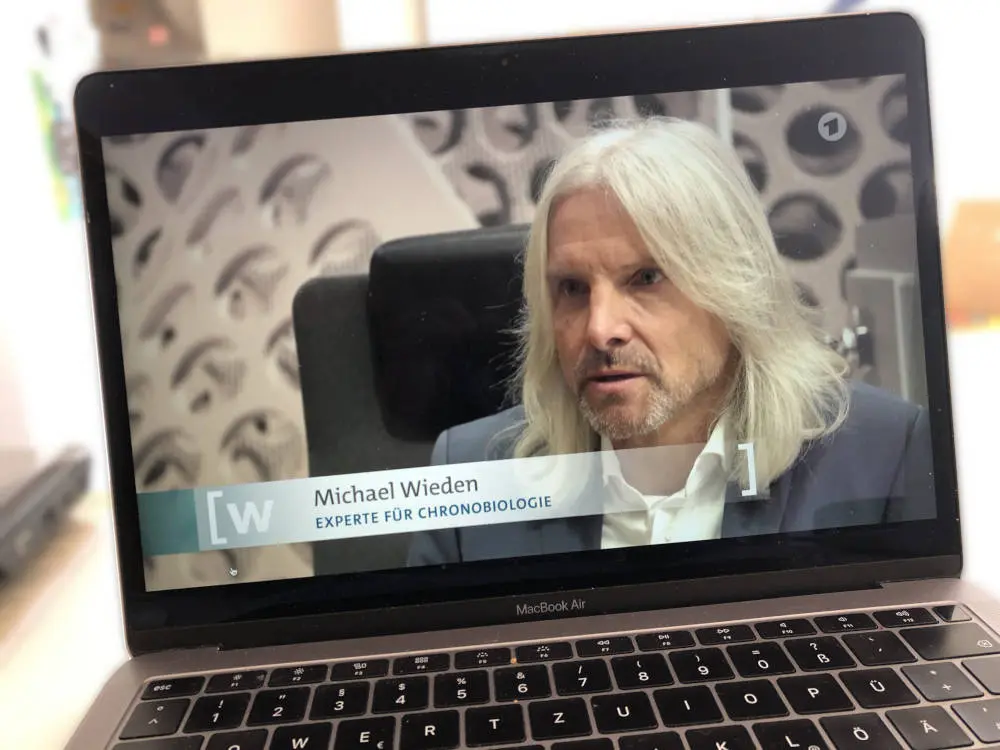The chronobiology project at the Wartenberg Clinic entered its second round. If a chronobiology follow-up project is funded by the same health insurance company that…
Project "Get up without an alarm clock" - Fa. Späh

Initial situation
“Get up without an alarm clock” project:
12 participants
16 weeks of coming to work when you are well-rested
3 weeks of the previous reference period without any change served as a baseline
Period: January 2019 – June 2019
Goals
On the part of the employees:
- Reducing the risk of illness, especially in the area of mental stress (burnout, depression, psychosomatic consequences, etc.)
- Improvement of personal well-being
- Increase in the average duration of sleep
- Improving the quality of sleep
On the part of the company
- Reduction in absenteeism
- Reduction of the error rate
- Increasing motivation
- Strengthening employer branding
- Recruitment of skilled workers
The project
The DLMO (Dim light Melatonin Onset) is the time at which melatonin secretion begins in the evening. This point in time is different for everyone. Based on this, the chronotype or biological sleep time was determined on a scientific basis. Over the course of the project, the participants then kept a daily diary to document developments. These diaries were analyzed scientifically at the end.
The result
Alarm clock use
In the reference period (3 weeks), an average of 68.1% of participants used an alarm clock. In the following weeks, only 18.09% on average, with a further downward trend towards the end of the study period. The participants obviously increasingly dared to actually turn off the alarm clock. Furthermore, the remaining use of the alarm clock was also partly due to indispensable operational necessities that could not be adjusted at short notice.
Here it was observed that the positive effects of the increasing elimination of an alarm clock also had a positive effect on the remaining days with alarm clock use.
The voluntary nature and increasing use alone have therefore already had a positive impact on the overall picture.

Sleep duration
The results are not really surprising. Even though the test group was relatively small, a clear trend can be identified. If the participants slept for approx. 7.05 hours in the reference period, the figure was 7.35 hours in the following 13 weeks. As a result, they slept an average of 30 minutes longer. It is interesting to note that almost 60% slept between 31 and 77 minutes longer.
However, two participants slept less than in the reference period, which was reflected in the calculation of the average of all participants. Of these, one participant was a moderate early type according to the blood test. Early birds often benefit less from the freedom to wake up without an alarm clock, as they often wake up at the appropriate times without an alarm anyway. Interestingly, the extra sleep on working days is not only due to waking up later, but also to falling asleep earlier.
Another interesting effect was that people slept 24 minutes less at weekends. There, the average sleep duration fell from 7.47 hours to 7.28 hours. The need to sleep at the weekend therefore appears to be reduced as the amount of sleep on working days and days off is equalized.
Performance in the morning
A trend was also identified in terms of performance during the test period. On days without an alarm clock, the percentage of positively rated performance (values striving towards the best rating) increases from 54 – 69 at the beginning to values above 90 towards the end of the study. Even on the remaining days with alarm clocks, the percentage of positively rated performance increases from 55-70 at the beginning to 100 towards the end of the study. This suggests that the longer average sleep duration also has a positive effect on performance on the days on which the participants had to reach for the alarm clock for various reasons.
The assessment of performance is of course a subjective perception. However, a positive perception is in itself very positive for the company, as it also has an influence on motivation.
Quality of sleep on working days
The number of positive evaluations (values aiming for the best rating) increases over the course of the study weeks. On days with an alarm clock, the percentage of positively rated sleep quality increases from 64 – 85 at the beginning to 100 towards the end of the study. On days without an alarm clock, the percentage of positively rated sleep quality increases from 77 – 83 at the beginning to 90 – 100 towards the end of the study.
Summary of the results
- Leaving the alarm clock off in the morning allowed participants to sleep longer on both working days and days off. This effect resulted from both an earlier sleep time and a later wake-up time.
- Over the 16-week study period, there was a positive development in the subjective assessment of sleep quality and performance in the morning.
- Over the 16-week study period, there was a positive development in the subjective assessment of sleep quality and performance in the morning.
Conclusion of the accompanying and evaluating scientist
“The results of this pilot study are meaningful and positive. Continuing the option of not setting the alarm clock in the morning on working days is recommended.” Prof. Dr. habil. Thomas Kantermann
Consequences
As a result, it became clear that sometimes it doesn’t take a major upheaval to achieve positive changes in terms of health and business. This project has clearly shown the positive influence that working according to the internal clock, but also the knowledge of chronobiology, e.g. through company-internal lectures and workshops, has on reducing psychological pressure. The pressure to be at work early despite the flexitime offer is often caused by the perceived expectations of colleagues and company management.
As a result of the “Get up without an alarm clock” project, employees ended up using flexitime to a much greater extent than before. The employees slept an average of 30 minutes longer and participants reported in the final interviews that the sagging after getting up was gone, so that they were able to start their work with much more concentration. Such a development generates more sleep, fitness in the morning, concentration and satisfaction through awareness and experience, without requiring a restructuring of working hours per se.

Press & Media
The media response was huge. Here you will find an excerpt, partly with links to the respective reports. Some fall under the paywall of the respective publishers. Some are only temporarily accessible (e.g. ARTE)
Click on the links to leave the website “www.wieden.com”
Radio 7
Zu allen Themen biete ich Online-Vorträge und Online-Coachings an. Du findest Buchungsmöglichkeiten hier. | Du willst Feedbacks meiner Kunden sehen? Eine Auswahl habe ich hier zusammengestellt. | Abonniere mein ChronoCoach-Update, den Newsletter für Ausgeschlafene |
To the topic matching articles
- Chronobiology project at Wartenberg Clinic - ChronoClinic a unique project in personnel deployment planning
- 3x snooze button on the alarm clock - harmful or not?
Is the snooze button on the alarm clock harmful or not? or ... when the alarm clock wakes you up three times!That is actually the…
- Projekt "Aufstehen ohne Wecker" - Fa. Späh
Projekt "Aufstehen ohne Wecker" - Fa. Späh AusgangssituationProjekt "Aufstehen ohne Wecker":12 Teilnehmer*innen16 Wochen zur Arbeit kommen, wenn man ausgeschlafen ist3 Wochen Referenzzeitraum davor noch ohne…
